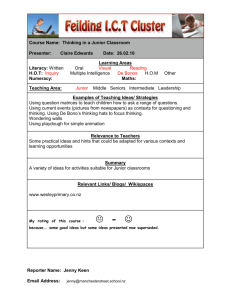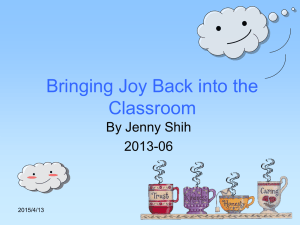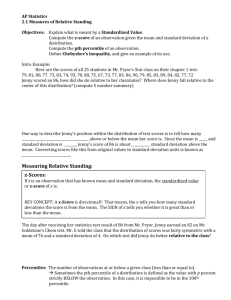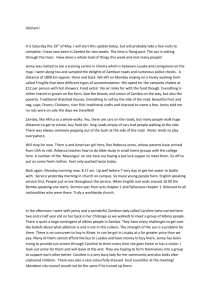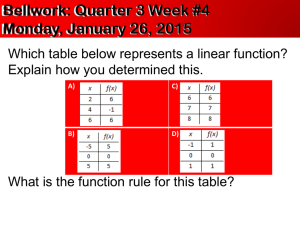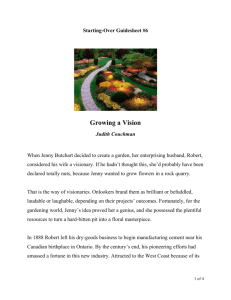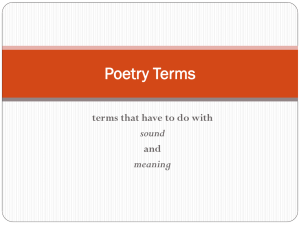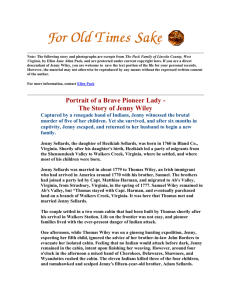Sarah Browne Name: *Jenny Age: 9 Grade: 3rd Sex: Female Race
advertisement
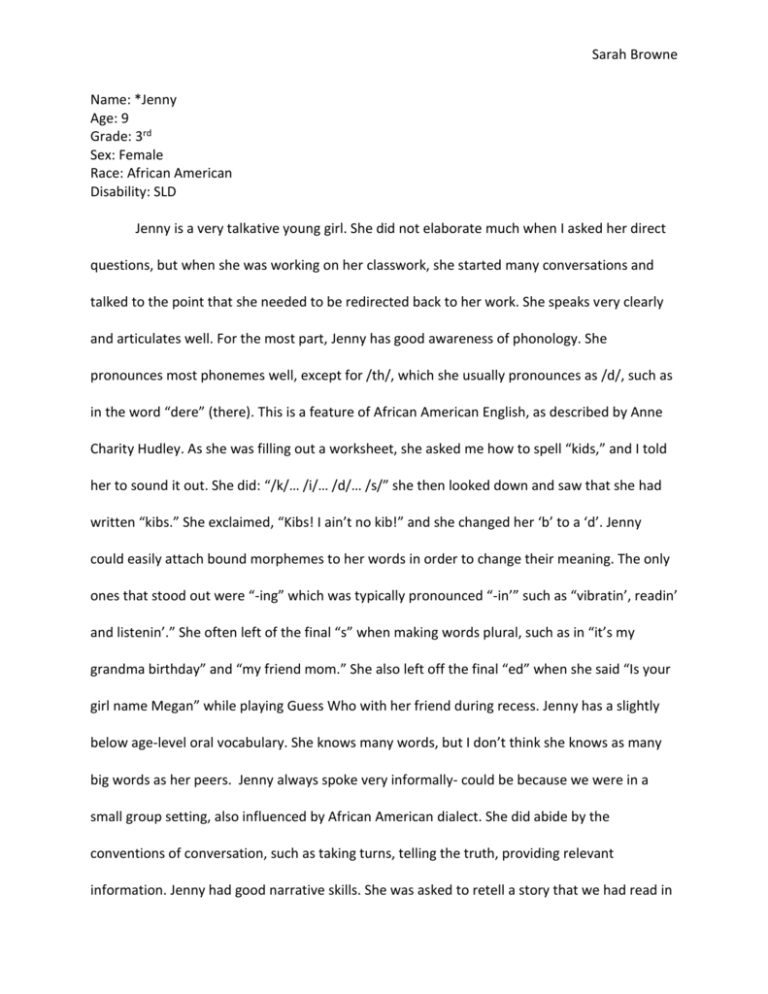
Sarah Browne Name: *Jenny Age: 9 Grade: 3rd Sex: Female Race: African American Disability: SLD Jenny is a very talkative young girl. She did not elaborate much when I asked her direct questions, but when she was working on her classwork, she started many conversations and talked to the point that she needed to be redirected back to her work. She speaks very clearly and articulates well. For the most part, Jenny has good awareness of phonology. She pronounces most phonemes well, except for /th/, which she usually pronounces as /d/, such as in the word “dere” (there). This is a feature of African American English, as described by Anne Charity Hudley. As she was filling out a worksheet, she asked me how to spell “kids,” and I told her to sound it out. She did: “/k/… /i/… /d/… /s/” she then looked down and saw that she had written “kibs.” She exclaimed, “Kibs! I ain’t no kib!” and she changed her ‘b’ to a ‘d’. Jenny could easily attach bound morphemes to her words in order to change their meaning. The only ones that stood out were “-ing” which was typically pronounced “-in’” such as “vibratin’, readin’ and listenin’.” She often left of the final “s” when making words plural, such as in “it’s my grandma birthday” and “my friend mom.” She also left off the final “ed” when she said “Is your girl name Megan” while playing Guess Who with her friend during recess. Jenny has a slightly below age-level oral vocabulary. She knows many words, but I don’t think she knows as many big words as her peers. Jenny always spoke very informally- could be because we were in a small group setting, also influenced by African American dialect. She did abide by the conventions of conversation, such as taking turns, telling the truth, providing relevant information. Jenny had good narrative skills. She was asked to retell a story that we had read in Sarah Browne class the day before, and she told us the main elements of the story in order. She left out many details, but stayed on topic and could get her point across. Jenny’s syntax is characterized by elements of African American English. She often used the helping verb “ain’t”, such as when she said “I ain’t take no AR!” In this sentence she also uses a double negative, which is often used in African American English to convey extra emphasis. In standard English, this sentence would have been “I haven’t taken an AR” (An “AR” is an online Accelerate Reader test that students can take after they read a book). Another feature of African American English described by Charity Hudley is verbal play. I notice that when Jenny and her friend were playing during indoor recess in my classroom, they provoked and picked on each other and neither seemed to be offended by it. They also spend several minutes comparing whose attitude was bigger. Jenny’s biggest difficultly with language development is in decoding. Although she knows her phonemes, she has trouble decoding words as she reads them. While reading in class, she consistently said “Jack” instead of “Jake,” despite being corrected several times. This makes sense, because without knowledge of the silent “e” making a vowel long, both words would be pronounced /j//a//k/. She is unfamiliar with the sounds long vowels make. She often guessed at words without really reading them such as reading “ride” for “rode” and “cotton” for “couldn’t.” The most important facet of language to address during instruction with Jenny is the use of School English. Although she is below grade level in reading, she speaks very well, but in an African American English dialect. As Charity Hudley discusses in her book, there is absolutely nothing wrong with speaking in one’s native dialect. However, within the walls of school, it is Sarah Browne better to speak in School, or Standard English. Learning School English and its appropriateness will also help Jenny later in life when she beings to apply for jobs, college, and other things. Speakers of School English are generally perceived to be more intelligent than speakers of other English dialects. Jenny will need to be explicitly taught the differences between School English and African American English and when each is most appropriate. Another area to address is decoding. Jenny will need to practice decoding words be taught strategies for how to approach a word if she does not know what it is. She also needs to be explicitly taught the differences between long and short vowels. Formal evaluation of Jenny’s reading ability, phonemic awareness, and fluency would help me make further instructional decisions to help her in the areas she needs most. *Student’s name has been changed to protect privacy Sarah Browne Transcript: a) Have a conversation with your student What’s happening in this picture? “It’s a girl pointing to the roller coaster.” Why does she want to go on the roller coaster? “It’s really high and it looks fun!” How do you know? “It’s right here!” b) Ask the student about something of interest Do you like cheerleading? Yes. I practice on Wednesday and Thursday.” What team do you cheer for? “The Might Jaguars” What sport do they play? “Football” What cheers do you know? “All of ‘em” What color is your uniform? “Blue and silver” (Note: Jenny was not very responsive when I asked her direct questions. She would answer the answer the question and not elaborate. In class, she was very talkative while she was working on her assignments, so I have more quotations from here there) c) Observe your student in a social situation: Indoor recess “My stomach vibratin’. Like on my back.” “One of my friend mom, she got pollen all in her house, cuz she left the doors open.” “Me and (friend’s name), we ate 2 things of food” “He always left the first one done.” Playing ‘Guess Who’: “Is your girl name Megan?” d) Observe your student during a class activity: Reading and Math o “What’s a ‘musement park?” o Consistently said “Jack” instead of “Jake” o Summarizing story: “They’re gonna go on there and little girl’s gonna be scared probably” o Keep going. “What, readin’?” o “Like she was scared. She wanted to get on really bad…her mama wan’t scared” o “She wanna go back on ‘dere” o “I ain’t take no AR!” o Writing an answer “the kids”. Sounds out phonetically as she writes it: “/k/ /i/ /d/ /s/’- looks down and sees that she wrote “kibs.” “Kibs! I ain’t no kib!” o “It rounds to two hunned” o “Can I go to the liberry?” o “Sorry, it slipped out!” o “It adds one more” o “Am I the only one listenin’ in here?” o “He’s gonna…” Sarah Browne o o o o o o “It’s in between the friend house” “The 2 become a 1” “I’m not gonna tell you all the otha’ answers. Just pick what you pick” “All that? Dang” “Today’s my grandma birthday” “Can I tell you something? One time, when we was with Miss Hill….”
